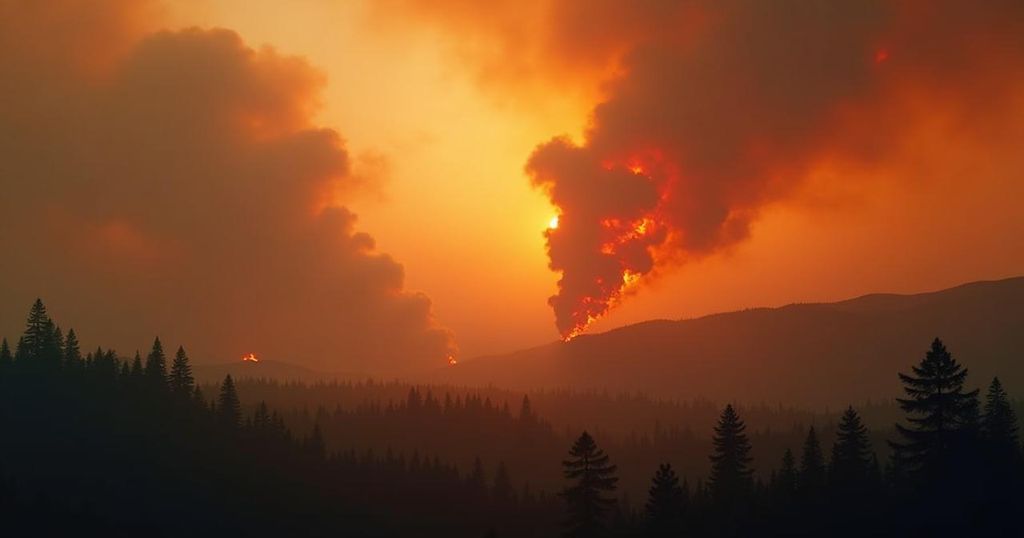The Dire Environmental Crisis in South America: A Call to Action for the Amazon
South America is grappling with severe wildfires predominantly caused by human actions, resulting in health crises and ecological destruction across several countries. The smoke shrouding regions like Rondônia, Brazil, has impeded daily life, while experts highlight that this calamity affects the entire continent, exacerbated by climate change and agricultural policies, leading to widespread calls for urgent action to protect this vital ecosystem.
“The Earth is crying out for help,” as widespread wildfires concentrate their devastating effects on South America, shrouding vast areas in thick smoke. The anthem of Rondônia, a region in Brazil’s Amazon, once praised its blue skies, but those skies have now been obscured by smoke from extensive man-made wildfires that have erupted in areas from Ecuador to Paraguay. The repercussions have been severe; flight operations have been disrupted, schools have closed, and respiratory problems have surged as residents inhale the toxic air. Dr. Lilian Samara de Melo Lima, a local physician, illustrates the dire circumstances, noting that visibility has become dangerously low, compelling citizens to contend with the grim realities of this ecological disaster. Critical deforestation, attributed to agricultural expansion, is intensifying the annual burning season, which has reached unprecedented levels this year. According to health officials in Porto Velho, where respiratory issues have surged, they describe an overwhelming sense of despair regarding the environmental decline. The impact of these fires extends beyond Brazil; countries such as Colombia, Guyana, and Venezuela have experienced similar calamities. “We have a problem across the continent, it’s not only Brazil,” asserts Erika Berenguer, an Oxford University scientist, as fire hotspots multiply across satellite imagery. Moreover, Paraguay has seen extensive destruction of the Chaco ecosystem, burdening its agricultural economy. Forest fires have devastated large expanses of land, critically affecting indigenous communities like the Ayoreo, who rely on these territories for sustenance. In Peru, the fires have claimed lives and devastated natural habitats, prompting states of emergency. The government’s attribution of these fires to traditional practices has drawn criticism from experts, who argue they are often ignited to facilitate illegal agricultural activities. As the situation deteriorates, paramedics like Christian Rivera in Ecuador voice grave concerns over the unprecedented scale of the crisis. Fires have devastated agricultural lands in Bolivia as well, leading to a national disaster declaration from the president. Health Secretary Marilene Penati encapsulated the collective sentiment amongst those on the frontlines, stating that the Earth is fundamentally unwell. Despite calls for profound transformation from global leaders, including a poignant message from Pope Francis, many fear that humanity is failing to heed these urgent warnings. The implications of these ongoing environmental crises are not only grave for South America but reflect a larger, global ecological emergency.
The ongoing wildfires across South America represent a significant environmental crisis influenced by human actions such as illegal deforestation and land clearing for agriculture. As climate change exacerbates the situation, regions that were once lush rainforests are succumbing to smoke that threatens the health and livelihoods of millions. The phenomenon is compounded by natural events such as the El Niño, which creates heightened drought conditions, further increasing the risk of fires. The Amazon Rainforest, often referred to as the Earth’s lungs, faces unprecedented pressure as local populations grapple with the health consequences of smoke, leading to surges in respiratory and other health issues. Indigenous communities and unique ecosystems are at serious risk, leading many to call for urgent action to combat the devastating effects of climate change and unsustainable agricultural practices. The overarching narrative highlights a failure to address environmental stewardship, with growing evidence that unchecked deforestation and fire management strategies pose dire threats to biodiversity and climate stability.
In summary, South America is currently experiencing an extensive environmental crisis characterized by unprecedented wildfires fueled by deforestation, climate change, and inadequate agricultural practices. The resultant health challenges and ecological destruction highlight an urgent need for collective action to address these pressing issues. As experts emphasize the broader implications of these local challenges, it is clear that the fate of the Amazon and its inhabitants rests significantly upon the choices that humanity makes in the coming years. The resonant calls for change serve as poignant reminders of our collective responsibility towards our planet.
Original Source: www.theguardian.com




Post Comment